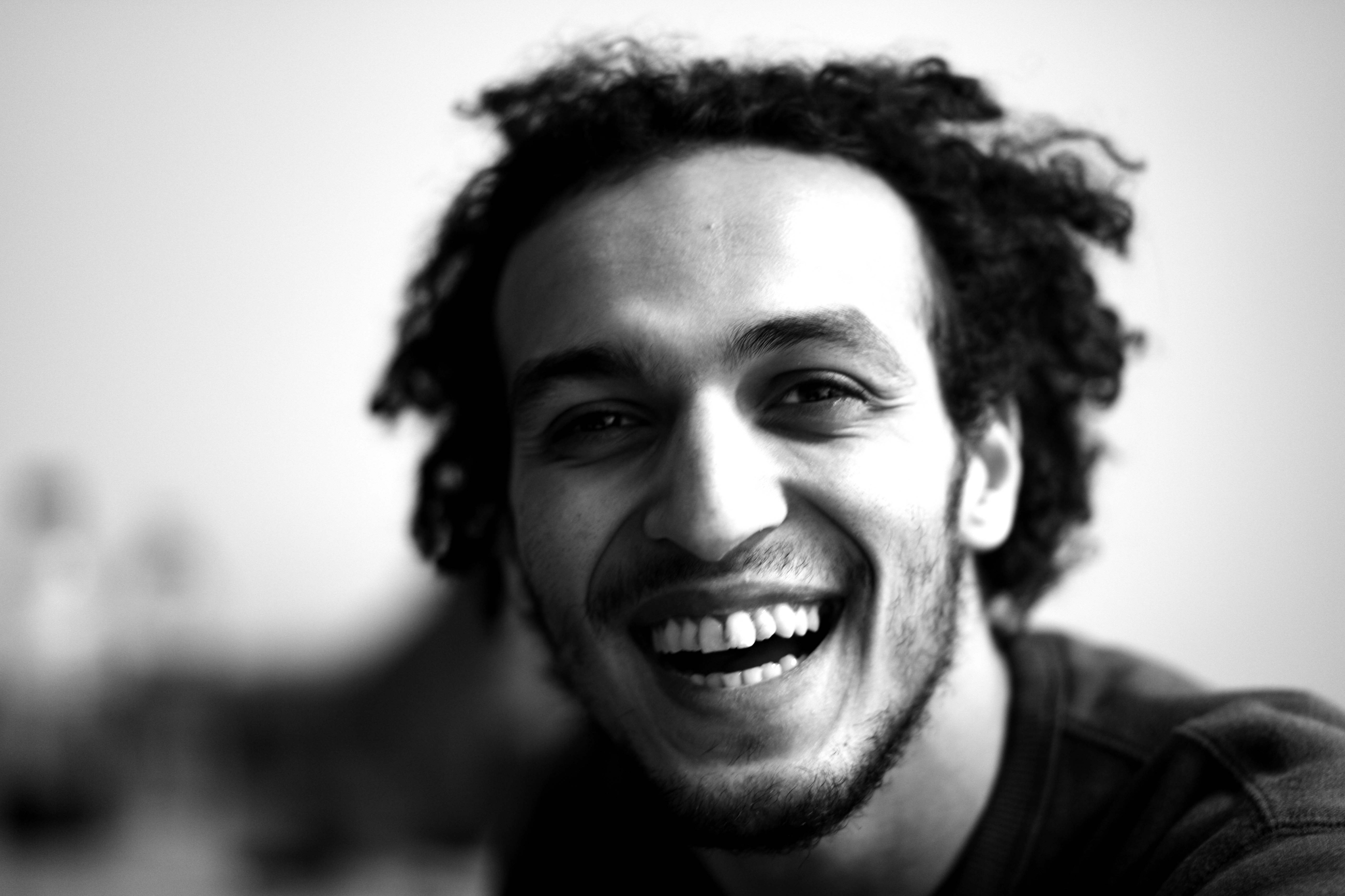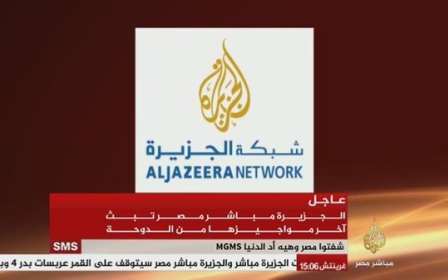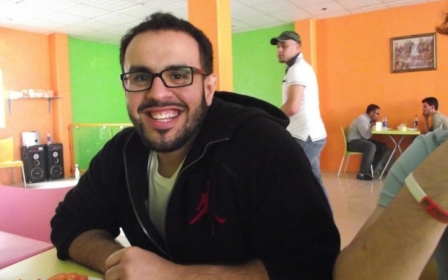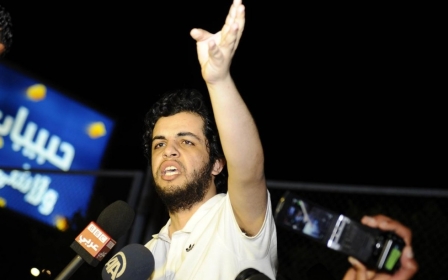Sunset in the black hole: 500 days in prison

CAIRO: “I have been kidnapped and imprisoned, for almost sixteen months now. 500 days in prison, without committing any crime. My family are unable to negotiate my release. I am an innocent man.”
This is how an open letter from 27-year-old Egyptian photojournalist, Mahmoud Abou Zeid - also known as “Shawkan” - begins.
Shawkan was arrested on 14 August 2013, whilst photographing the forced clearance of the protest camp in support of the ousted Muslim Brotherhood-affiliated president, Mohamed Morsi in Raba’a Al-Adaweya, Cairo.
“I have been interrogated once by the authorities since my arrest. My detention has been renewed every 45 days and I have not been charged with a single crime”, writes Shawkan.
The letter - released on 20 December - was written from Cairo’s Tora prison and is entitled “Sunset in the black hole”, referring to a tiny strip of light that comes through an iron mesh in his cell. The letter provides insights into the mental and physical struggles of Egyptian incarceration.
Shawkan is being held for 22 hours a day in a 3 x 4 metre cell, shared with 12 other men, which he describes as a “dungeon” that is “not even suitable to be a cage for animals. I sleep on the floor. Every day is the same.” Shawkan writes that he often sleeps for 13-14 hours a day and spends two hours a day outside of his cell in “a small cage under a sun that I can barely feel”.
Shawkan says that his cell is periodically searched and that his belongings are frequently scattered or stolen. He laments the lack of privacy and dignity in which 13 men have to use the bathroom in a room in which they all sleep, cook, eat, and pray.
He claims that his family is forced to wait 7-8 hours each time they arrive for their weekly visit, facing “insults and degrading treatment”.
Last month, the Committee to Protect Journalists (CPJ) wrote that “As Egypt prepares to elect a new parliament, the government continues to crack down on the press, forcing independent and critical voices into silence, exile, or prison.”
Six journalists have been killed and dozens have been detained since the military ousted Morsi last year, according to the CPJ. At least 11 journalists remain imprisoned.
Egypt was the fourth highest country in terms of the number of journalists imprisoned in 2014, according to a recent report by Reporters Without Borders.
Islamists, secular activists, students, football fans, and NGO workers have also been arrested in a wider crackdown on dissent. According to independent online statistics group, Wiki Thawra, over 41,000 people have been arrested since the ousting of Morsi in July 2013.
An Egyptian government delegation defended itself at the United Nations’ Universal Periodic Review last month against wide-ranging allegations of human rights abuses, and stated that the law guarantees freedom of expression.
Amnesty International responded to the claim by stating that they have “documented a number of cases where individuals have been detained solely for exercising their right to freedom of expression, most notably the case of Al-Jazeera media workers, Mohamed Fahmy, Peter Greste and Baher Mohamed and the case of Mahmoud Abu Zaid [sic] who is detained over a year without charge.”
French photographer Louis Jammes was with Shawkan when he was arrested. Jammes says that, although they identified themselves to the security forces as journalists, they were beaten, detained, and loaded onto trucks - their cameras confiscated. Shawkan and Jammes were taken to Cairo stadium where the Egyptians were separated and held, whilst the foreigners were questioned and released. Shawkan claims that he endured three days of systematic beatings by the security forces along with 47 other prisoners.
Although he has not been officially charged, Shawkan is facing 12 allegations according to his brother Mohamed which include murder, inciting violence, and being a member of the Muslim Brotherhood, which has now been designated as a terrorist organisation - charges which, if brought, could result in the death penalty.
His friends and family find the allegations absurd and impossible to understand. Earlier this year, his friend Yehia El-Sherbini said that Shawkan supports neither the Muslim Brotherhood nor President Abdel Fattah Al-Sisi. “He is independent,” said El-Sherbini.
Shawkan had been a freelance photojournalist for more than six years and was working for the London-based photographic agency Demotix at the time of his arrest. His work has appeared in a range of international publications including Time Magazine and Die Zeit, he has also worked for Corbis agency, and his images have been used by human rights organisations such as Amnesty International and Index on Censorship.
As a freelance journalist, Shawkan did not have official accreditation with the Press Syndicate. However, Demotix have provided the Egyptian authorities with confirmation that Shawkan was working for them. His friends and family have collected around 3,000 signatures from Egyptian and foreign journalists stating that Shawkan is a journalist. Shawkan’s lawyer has made several appeals to the general prosecutor to plead for his release. The CPJ, alongside a local NGO are also providing Shawkan with legal support, and - along with his family and other supporters - have lobbied politicians on his behalf.
Amnesty International considers Shawkan to be a prisoner of conscience and has called for the authorities to release him immediately and unconditionally, and to investigate allegations that he was beaten whilst in custody.
Yet, these efforts have had no discernable impact. Every 45 days Shawkan’s detention is renewed. On 26 December, Shawkan will have spent 500 days in detention.
Al-Jazeera journalist, Abdullah Elshamy - also arrested on 14 August 2013 at Raba’a, but released in June 2014 following a hunger strike - said in September that he had become friends with Shawkan in prison.
“There is no common sense about why is he still in jail and why was I was set free,” said Elshamy, who has maintained contact with Shawkan and said that his morale was fading. “Freelancers don’t get any kind of attention because there is no company or organisation to support them. I’ve seen a lot of freelancers in Tora who were kind of forgotten - photographers or journalists or cameramen. The whole situation of the media has gone from bad to worse, and from worse to terrible.”
“We hope to apply international pressure on the Egyptian authorities and see Shawkan released without having to go through a farcical trial,” said Fiona Moore, an activist and friend of the family who is organising a social media campaign, calling for Shawkan’s release. “International awareness of his case lets the Egyptian authorities know that we are watching, it provides a degree of accountability.”
Sabiha Mahmoud, a British-based photojournalist who is friends with Shawkan, says it is ironic that he has also been accused of “tarnishing Egypt’s image” by the authorities. “There is very little that could tarnish the image more than allowing the injustice of keeping an innocent man in prison for more than 500 days,” said Mahmoud. “We demand his immediate release.”
Shawkan’s letter also shines a rare light inside the opaque Egyptian penal system.
“Please forgive me, there are many things that I have missed telling you, like my hopes to travel, my love of music, films and nature, but my dreams are becoming narrow. The same as the black hole I am living inside,” writes Shawkan.
“I simply ask that now that you know of me, please do not turn away. I am a photojournalist, not a criminal.”
New MEE newsletter: Jerusalem Dispatch
Sign up to get the latest insights and analysis on Israel-Palestine, alongside Turkey Unpacked and other MEE newsletters
Middle East Eye delivers independent and unrivalled coverage and analysis of the Middle East, North Africa and beyond. To learn more about republishing this content and the associated fees, please fill out this form. More about MEE can be found here.




